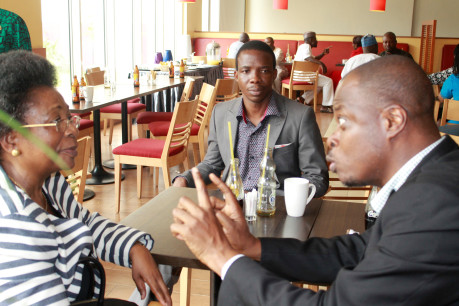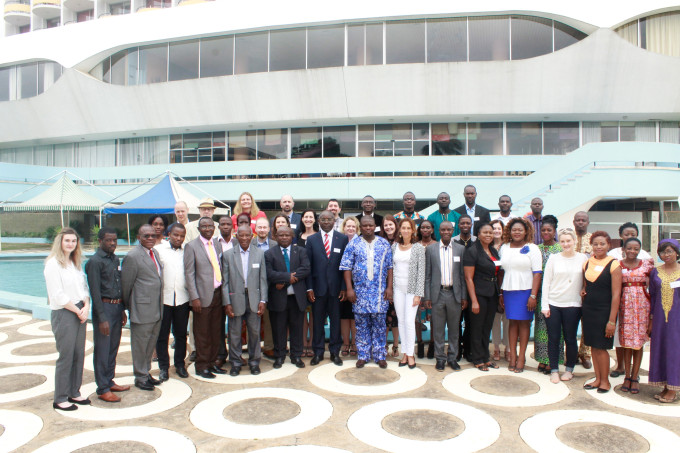
By Akinola Oluwole, Kabiru Salami, Luret Lar, Solomon Jacob, Ndelle, Dr Obiageli Nebe, Pamela Bongkiyung
COUNTDOWN is a consortium which is using a multidisciplinary approach to research with the aim of contributing to policy change in the implementation of Neglected Tropical Diseases (NTDs) control and elimination programmes. We are working in four countries: Nigeria, Liberia, Ghana and Cameroon.
There is an African proverb that says “If you want to go quickly, go alone. If you want to go far, go together.” This proverb fits with the COUNTDOWN consortium’s vision to improve the control/elimination of NTDs through a "multidisciplinary research approach" to generate quality data. To achieve this, the consortium draws together experts from different disciplines. Undertaking good multidisciplinary research is an art which takes time and dedication. Reflecting on our experiences it is important to consider the following factors:
Harmonise Objectives
The first task as a multidisciplinary team in COUNTDOWN is the need for the different disciplines involved to come together and identify the main objective of the project, the different specific objectives and responsibilities of each discipline. This can be done by developing sub-objectives together which ensures complementarity and avoids duplication. COUNTDOWN has gone further in exemplifying harmonisation through its numerous workshops held to plan and streamline calendars and cross-them working. One of such workshops held in Limbe, Cameroon birth lessons highlighted in this blog – “Multidisciplinary Research at the Foothills of a Live Volcano” by Professor Sally Theobald.
Respect of Values
To work together as a strong team and for the team to thrive, respect for each team member’s values and recognising each other’s strengths and weaknesses, is a good recipe for working together. There is a need for willingness on both sides to start from the basics and move forwards, with mutual respect for disciplines. One way of ensuring respect and collaboration is working from the central concept of a single team rather than separate ones. When you travel to the field we have one goal in mind – producing quality evidence research. There should also be a conflict resolution plan, to inform how disagreements (which inevitably happen) can be resolved.

L-R: Professor Uche Amazigo, Dr Oluwatosin Adekeye & Dr Akinola Oluwole
Establish Coordination of Activity Timelines, and Programmatic Structures for Communication
As a multidisciplinary group, the need to come up with deliverables, given a timeline and budget to the activities cannot be over emphasized. This is to avoid delays or setbacks to implementing time-related activities as well as preventing discord that may arise from overspending on one discipline to the detriment of another.
In addition, an effective coordination and communication structure with quality study design and purpose must be put in place. The team must agree on how data will be harmonized across the different disciplines requiring that all team members make a concerted effort to understand each other’s methodologies, decision on authorship order in publication and most important of all having equal access to data generated. This will ensure the continuous involvement of all disciplines where everyone’s voices are reflected and count equally in identifying research problems and shape teams to meet research needs. It is equally important that from concept to delivery, all country-level managers of NTD programmes need to be involved as they play a crucial role in effective implementation of the research objectives and outcome.
Physical interaction among the team members is also important as this will enable members to agree on ideas. There should be time for face to face interaction through periodic meetings so that members of the team can ask questions, resolve conflicts, clarify issues, explain and agree on different disciplinary terminologies and perspectives. During the meetings, team members are encouraged to come open-minded to learn new ideas and maintain regular communication with feedback.
This is embodied in COUNTDOWN’s Annual Partners Meeting (APM), where partners that make up the consortium, from the various countries (Cameroon, Ghana, Liberia, Nigeria, UK & USA) come together to learn about progress in each country and cross-sharing of knowledge takes place during discussions. The recent partners meeting took place in Yaoundé, Cameroon from 28 – 30 March 2017.

Capacity Development Within COUNTDOWN, we do not use capacity development interchangeably with training. Training is one component of developing capacity, which we take seriously as seen in the PCR training in Ghana, the recent Evidence Synthesis held in Yaoundé, Cameroon from 7 – 9 February 2017, including Health Economics data analysis, basic Nvivo and qualitative analysis training at the APM. All our training has been designed to consider the local cultural, policy and organisational context. We recognise that shoring up capacity in the areas of policy research as seen in the recent situational analysis undertaken by the Nigeria COUNTDOWN team, policy immersion (our collaboration with policy making bodies) and awareness building, are essential to the capacity development of COUNTDOWN.
Overall, there is a need for an inclusive leadership where a representative from each of the collaborating institutions forms a management team with the responsibility of driving the coordination of activities in multidisciplinary projects.
Other Reading:
Fostering Multidisciplinary Partnerships: Illuminating the 'Elephant in the dark"
The Neglected Tropical Disease Hotspot Puzzle Requires Multidisciplinary Investigation
